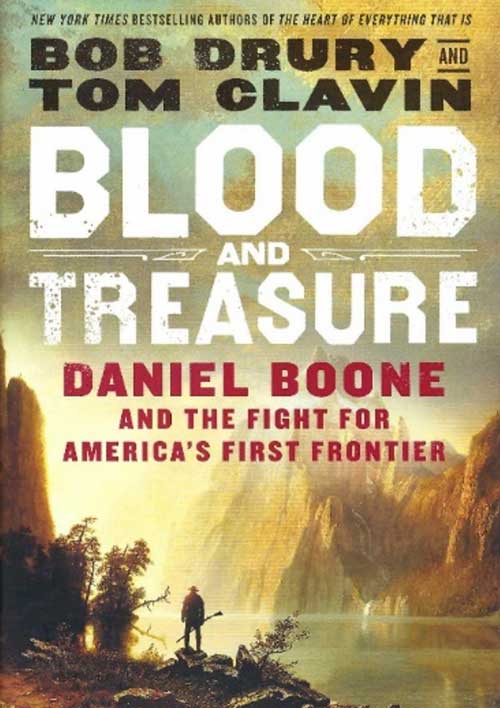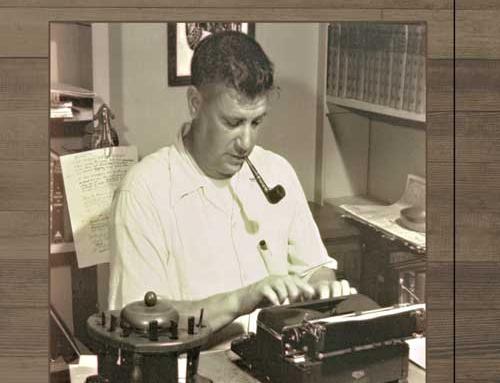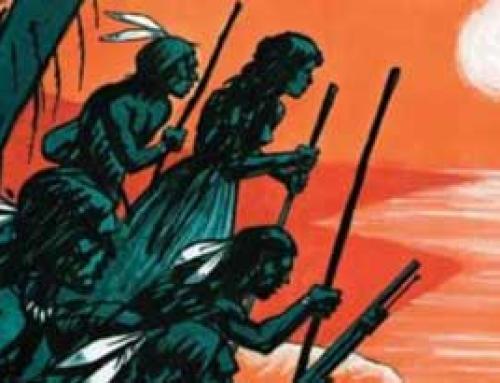It is the mid-1700s, and England’s colonists in North America are eager to explore and settle the forest frontier west of the Appalachian mountains. This is the setting of the new book (2021), “Blood and Treasure.” The guide to this epic narrative is America’s first pathfinder, Daniel Boone – not the coonskin cap-wearing caricature of popular culture, but the flesh-and-blood frontiersman and Revolutionary War hero whose explorations would become the stuff of legend.
 Born in 1734 to Pennsylvania Quaker parents, Boone lacked formal schooling but nevertheless learned to read and write and mastered enough mathematics to become an able surveyor. In 1750 his family moved to frontier North Carolina, where teenage Daniel first indulged his thirst for a life lived close to nature. He became a “long hunter,” one of a bold set of men who would vanish deep into the wilds for months at a time hunting and charting lands previously known only to Native Americans. Boone’s “early packhorse journeys into North America’s interior served as prologue to the country’s westward expansion.”
Born in 1734 to Pennsylvania Quaker parents, Boone lacked formal schooling but nevertheless learned to read and write and mastered enough mathematics to become an able surveyor. In 1750 his family moved to frontier North Carolina, where teenage Daniel first indulged his thirst for a life lived close to nature. He became a “long hunter,” one of a bold set of men who would vanish deep into the wilds for months at a time hunting and charting lands previously known only to Native Americans. Boone’s “early packhorse journeys into North America’s interior served as prologue to the country’s westward expansion.”
This book is a raw and rugged tale with no shortage of horror and gore. The work is not hagiographic in its appraisal of Boone, whose shortcomings – his business naivete, for instance – the authors readily acknowledge. And there can be no escaping the painful truth that Boone’s frontier aspirations were antithetical to Native American survival. Nonetheless, he emerges as a fundamentally decent man, particularly in his devotion to family.
Boone married Rebecca Bryan when he was 21, she 17. Theirs was a long and happy union, but not without its misadventures. In the autumn of 1762, Boone returned from extended militia service to find Rebecca had given birth to a child. It could not have been his; Boone had been gone for more than a year. Rebecca tearfully confessed that, thinking him dead, she had sought “comfort and solace” from Daniel’s unmarried younger brother, Edward.
Concluding that he had “married a woman, not a painting of a saint,” Boone not only forgave Rebecca her infidelity but also confessed his own dalliances with Native American women while away from home. As for the child’s paternity, Boone purportedly said: “So much the better, it’s all in the family.”
Neither Boone’s relationship with his younger brother nor his new “daughter” suffered. “It was a typical Boone moment,” say the authors: “Slow to anger, quick to understand, and anxious to see life’s ironies from another’s point of view.”
As a husband and father, Boone’s restlessness and need for adventure caused him to relocate his family several times, and in 1773 he led a group of colonists in the first attempt to establish a British settlement in present-day Kentucky. The immigrants met with fierce resistance from the Shawnee and other local tribes, and Boone’s 16-year-old son, James, was killed in an ambush. Clavin and Drury detail numerous atrocities committed by both colonists and Native Americans during the settling of Kentucky.
In one episode, Boone rescued his kidnapped daughter and her two friends from a Shawnee camp in 1776. The authors also pay close attention to Boone’s June 1778 legendary escape from the Shawnee after months of captivity, and his four-day, 160-mile race back to Kentucky to warn the inhabitants of Boonesborough of an impending attack.
At age 49, Boone reported that “two darling sons and a brother have I lost to savage hands. But now I live in peace and safety in this delightful country . . . .”
The authors conclude by tracing the last 37 years of Boone’s life, including his move to Missouri and a western adventure that took him as far as the Yellowstone River, “a remarkable exercise in fortitude” for the old frontier hero.
“Blood and Treasure: Daniel Boone and the Fight for America’s First Frontier” by Bob Drury and Tom Clavin is the April selection for the Jesse Stuart Foundation’s Regional Readers book discussion group. The book group will meet on Tuesday, April 26 to discuss the book; coffee and conversation at 2:00 pm and the book discussion at 2:30 pm. The book group is open to all and new members are always welcome. For more information about purchasing the book or joining the Regional Readers, contact the JSF at 606-326-1667 or e-mail jsf@jsfbooks.com.
By James M. Gifford
JSF CEO & Senior Editor
It is the mid-1700s, and England’s colonists in North America are eager to explore and settle the forest frontier west of the Appalachian mountains. This is the setting of the new book (2021), “Blood and Treasure.” The guide to this epic narrative is America’s first pathfinder, Daniel Boone – not the coonskin cap-wearing caricature of popular culture, but the flesh-and-blood frontiersman and Revolutionary War hero whose explorations would become the stuff of legend.
Born in 1734 to Pennsylvania Quaker parents, Boone lacked formal schooling but nevertheless learned to read and write and mastered enough mathematics to become an able surveyor. In 1750 his family moved to frontier North Carolina, where teenage Daniel first indulged his thirst for a life lived close to nature. He became a “long hunter,” one of a bold set of men who would vanish deep into the wilds for months at a time hunting and charting lands previously known only to Native Americans. Boone’s “early packhorse journeys into North America’s interior served as prologue to the country’s westward expansion.”

This book is a raw and rugged tale with no shortage of horror and gore. The work is not hagiographic in its appraisal of Boone, whose shortcomings – his business naivete, for instance – the authors readily acknowledge. And there can be no escaping the painful truth that Boone’s frontier aspirations were antithetical to Native American survival. Nonetheless, he emerges as a fundamentally decent man, particularly in his devotion to family.
Boone married Rebecca Bryan when he was 21, she 17. Theirs was a long and happy union, but not without its misadventures. In the autumn of 1762, Boone returned from extended militia service to find Rebecca had given birth to a child. It could not have been his; Boone had been gone for more than a year. Rebecca tearfully confessed that, thinking him dead, she had sought “comfort and solace” from Daniel’s unmarried younger brother, Edward.
Concluding that he had “married a woman, not a painting of a saint,” Boone not only forgave Rebecca her infidelity but also confessed his own dalliances with Native American women while away from home. As for the child’s paternity, Boone purportedly said: “So much the better, it’s all in the family.”
Neither Boone’s relationship with his younger brother nor his new “daughter” suffered. “It was a typical Boone moment,” say the authors: “Slow to anger, quick to understand, and anxious to see life’s ironies from another’s point of view.”
As a husband and father, Boone’s restlessness and need for adventure caused him to relocate his family several times, and in 1773 he led a group of colonists in the first attempt to establish a British settlement in present-day Kentucky. The immigrants met with fierce resistance from the Shawnee and other local tribes, and Boone’s 16-year-old son, James, was killed in an ambush. Clavin and Drury detail numerous atrocities committed by both colonists and Native Americans during the settling of Kentucky.
In one episode, Boone rescued his kidnapped daughter and her two friends from a Shawnee camp in 1776. The authors also pay close attention to Boone’s June 1778 legendary escape from the Shawnee after months of captivity, and his four-day, 160-mile race back to Kentucky to warn the inhabitants of Boonesborough of an impending attack.
At age 49, Boone reported that “two darling sons and a brother have I lost to savage hands. But now I live in peace and safety in this delightful country . . . .”
The authors conclude by tracing the last 37 years of Boone’s life, including his move to Missouri and a western adventure that took him as far as the Yellowstone River, “a remarkable exercise in fortitude” for the old frontier hero.
“Blood and Treasure: Daniel Boone and the Fight for America’s First Frontier” by Bob Drury and Tom Clavin is the April selection for the Jesse Stuart Foundation’s Regional Readers book discussion group. The book group will meet on Tuesday, April 26 to discuss the book; coffee and conversation at 2:00 pm and the book discussion at 2:30 pm. The book group is open to all and new members are always welcome. For more information about purchasing the book or joining the Regional Readers, contact the JSF at 606-326-1667 or e-mail jsf@jsfbooks.com.
By James M. Gifford
JSF CEO & Senior Editor




